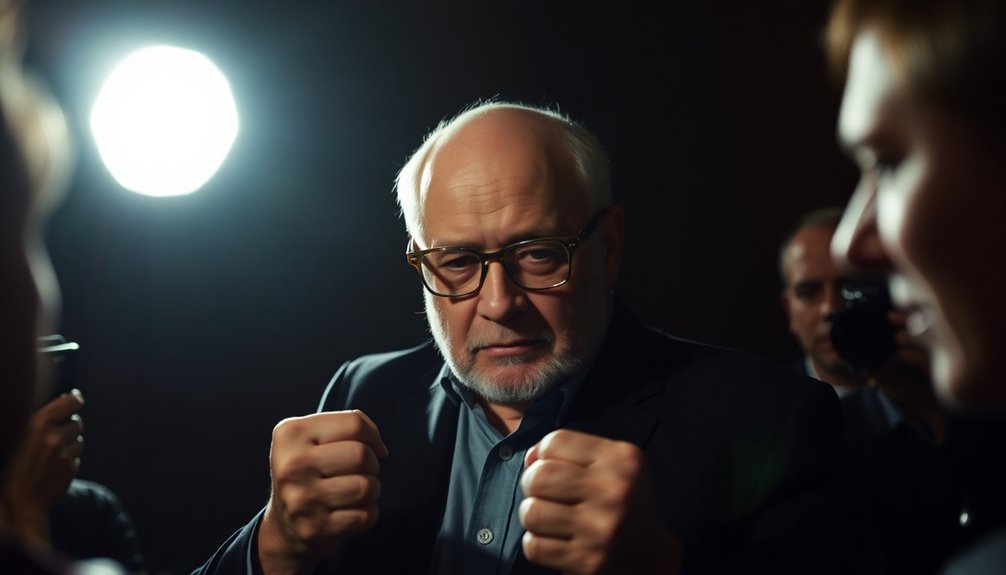Paul Schrader’s facing allegations of sexual harassment from his former assistant, Jane Doe, who claims he breached a confidential settlement agreement. These serious accusations involve forced exposure and unwanted advances. Schrader’s team denies the allegations, but the situation is putting his esteemed film career at risk. As the case unfolds in court, the spotlight shines on accountability in Hollywood. You’ll want to explore how this situation reflects broader issues in the entertainment industry.
Key Takeaways
- Jane Doe alleges Paul Schrader sexually harassed her, including forced exposure and unwanted advances, leading to a civil lawsuit.
- The lawsuit centers on Schrader’s breach of a confidential settlement agreement previously established with Doe.
- Schrader’s attorney, Philip Kessler, is preparing a defense, firmly denying all accusations made by Doe.
- The case highlights ongoing accountability issues in Hollywood and may impact Schrader’s career and future collaborations.
- Media attention on the allegations reflects broader societal concerns regarding sexual misconduct and the need for transparency in the entertainment industry.

The legal proceedings against Schrader reveal a complex web of claims. Jane Doe filed a civil lawsuit after he allegedly reneged on a confidential settlement agreement reached in February. This breach prompted her to seek enforcement of the agreement in New York State Supreme Court.
The legal battle against Schrader unfolds as Jane Doe seeks enforcement of a breached settlement agreement in court.
While the terms of the settlement remain confidential, the implications of failing to uphold it are significant. Schrader’s attorney, Philip Kessler, is currently reviewing the filings and preparing for a vigorous defense against the allegations. Notably, Doe’s claims include accusations of forced exposure and unwanted sexual advances.
As the media picks up on this story, it highlights the ongoing discourse surrounding sexual misconduct in Hollywood. Other industry figures have faced similar scrutiny, raising questions about accountability within this influential space.
Jane Doe’s attorney, Menaka Fernando, focuses on enforcing the settlement, while Schrader’s team firmly denies all allegations. With the case drawing public attention, many are reassessing Schrader’s contributions to cinema.
The impact of these allegations on Schrader’s career and reputation is profound. His status as a revered filmmaker is now clouded by these serious accusations, which could hinder future collaborations and projects.
As the legal proceedings unfold, industry peers and the public watch closely, hoping for a resolution that addresses the broader issues of accountability in the entertainment world.
Frequently Asked Questions
What Are Paul Schrader’s Notable Film Contributions?
Paul Schrader’s notable contributions to film include iconic screenplays like *Taxi Driver* and *Raging Bull*, showcasing his talent for powerful narratives.
You’ll find his directorial work in films such as *American Gigolo* and *First Reformed*, where he explores complex moral themes.
His unique visual storytelling and innovative narrative structures, especially in *Mishima: A Life in Four Chapters*, have left a lasting impact on American cinema and influenced generations of filmmakers.
Has Schrader Faced Similar Allegations in the Past?
No, Schrader hasn’t faced similar allegations in the past.
While he’s been involved in controversies, particularly regarding his comments on others in the industry, nothing has directly linked him to accusations of sexual misconduct until now.
You might find it interesting that his public statements generally focused on his films rather than personal issues.
This recent situation marks a significant shift in how he’s perceived within the film community.
How Has the Film Industry Reacted to These Accusations?
Like a storm sweeping through a quiet town, the film industry’s reaction to recent accusations has been swift and powerful.
You’ll notice a surge in public awareness and support for victims, with many industry members speaking out. Investigations are initiated, leading to policy changes aimed at preventing harassment.
This push for accountability transforms workplace culture, emphasizing safety and respect, ensuring that such issues are addressed head-on and don’t linger in the shadows.
What Legal Implications Could Schrader Face From the Allegations?
You could face serious legal implications from the allegations, including potential criminal charges if law enforcement gets involved.
Civil lawsuits might result in financial penalties, especially if you breach any settlement agreements.
Your professional reputation could suffer, impacting future opportunities in the industry.
Furthermore, public backlash and media scrutiny can amplify the situation, leading to possible exclusion from projects or organizations.
Navigating this legal landscape requires careful consideration and expert legal advice.
What Support Resources Are Available for Harassment Victims in Hollywood?
If you’re a harassment victim in Hollywood, you’ve got several support resources at your disposal.
You can reach out to the Entertainment Industry Helpline for workplace issues. Legal guidance is accessible through pro bono services, and advocacy groups can help you navigate your options.
For emotional support, consider joining free support groups or contacting hotlines like RAINN.
Conclusion
While some might argue that Schrader’s contributions to cinema should overshadow his alleged misconduct, it’s crucial to recognize that artistic talent doesn’t excuse inappropriate behavior. The allegations highlight a troubling pattern in the industry, where power dynamics can silence victims. By confronting these issues head-on, we not only support those affected but also push for a culture where respect and accountability are paramount. Art should inspire, not exploit, and it’s time to demand better from those we admire.










